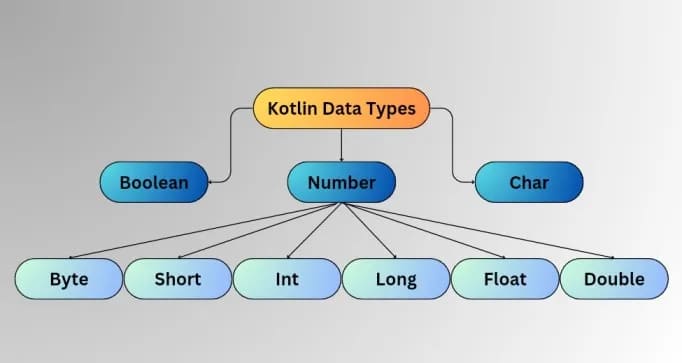Does Kotlin have primitive data types?
 Khush Panchal
Khush Panchal
In this blog I have came to the conclusion whether Kotlin actually have primitive data types or not?
Before jumping on the conclusion, let’s start with java:-
Java Representation
Primitive data types are the basic data types that are predefined in the language. There are 8 primitive data types in Java — boolean, byte, char, double, float, int, long, short
What if I want to make any primitive data type as nullable in java. Assigning null value to primitive data type gives compile time error. Every primitive data type have a wrapper class in java, so to make it nullable we use wrapper class instead.
int i = null; //error
Integer i = null; //works fine
Wrapper class is used to encapsulate primitive data types in java. This way we can use primitive data types as an object.
Wrapper class is useful in many ways, such as using reflection, data manipulation, enabling null values to primitive types, generic programming.
Wrapper class for each primitive data type in java is:
**boolean → Boolean, byte → Byte, char → Character, double → Double, float → Float, int → Integer, long → Long, short → Short
But everything comes with some consequences such as using wrapper class increases the memory of the program and comparatively slower.
How does Kotlin optimize this?
Kotlin doesn’t have primitive types directly.
Kotlin uses classes like Boolean, Byte, Char, Double, Float, Int, Long, Short as an object wrapper for primitives.
But whenever Kotlin code is compiled into bytecode, it converts the above classes into “primitive type” whenever possible.
Let’s understand with the example:
class KotlinPrimitive {
private var a: Int = 1 //variable a is declared as non nullable
private var b: Int? = 1 //variable b is declared as nullable
}
Decompiled version
public final class KotlinPrimitive {
private int a = 1;
private Integer b = 1;
}
When we decompiled the bytecode of the above code, we observed that Kotlin is converting the nullable data type into wrapper class (Integer), but when we declared the variable as non nullable it converts the variable directly into primitive data type.
Let’s see one more example:
class KotlinPrimitive {
fun funA() {
var c: Int? = 1
// do something
}
fun funB() {
var d: Int? = 1
// do something
d = null
}
}
Decompiled version
public final class KotlinPrimitive {
public final void funA() {
int c = 1;
//do something
}
public final void funB() {
Integer d = 1;
//do something
d = null;
}
}
As you can see in the above example, for the local function, Kotlin smartly checks for even nullable type that whether it is getting null in any point of time inside the function, if not, it converts that nullable type variable into primitive data type at bytecode level.
Conclusion
From above examples, we can see that Kotlin converts the non nullable data types into primitive data types.
Also for the local function it will convert the nullable data type into primitive data type when the nullable value is never assigned a null value.
So the conclusion is that Kotlin doesn’t have primitives directly but the data type in Kotlin converts to primitive data type at JVM level whenever possible.
Source code: Github
Contact Me:
Happy Coding ✌️
Subscribe to my newsletter
Read articles from Khush Panchal directly inside your inbox. Subscribe to the newsletter, and don't miss out.
Written by

Khush Panchal
Khush Panchal
Currently working as an Android Engineer at ALLEN Digital, making the learning journey smoother and more engaging for millions of students. Previously, I worked at Amazon MX Player, a popular video streaming platform with over 1 billion downloads, where I contributed to features across SVOD, Ad Tech, and Smart TV domains. I have hands-on experience across the entire Android development lifecycle — from planning and design to deployment — using modern tools and technologies like Kotlin, Jetpack Compose, KMP, CMP, ExoPlayer, Flow, and Coroutines. I graduated from IIT Kharagpur and was awarded the Institute Silver Medal for the best academic performance in my department, along with the Prof. Sudhir Ranjan Sengupta Memorial Prize for academic excellence. Beyond work, I’m an active open-source contributor with over 700 stars across various repositories, including EventKT (a highly customizable Android tracking library) and Ketch (an Android file downloader library with over 500 stars). I also write technical blogs that simplify complex topics for developers. I’m passionate about learning new technologies, solving challenging problems, and collaborating with diverse teams. Always open to exciting projects and opportunities to contribute.